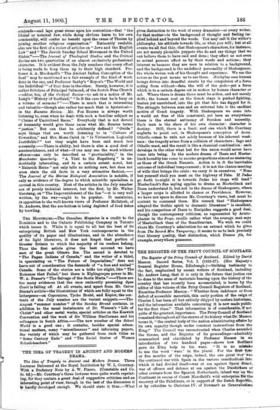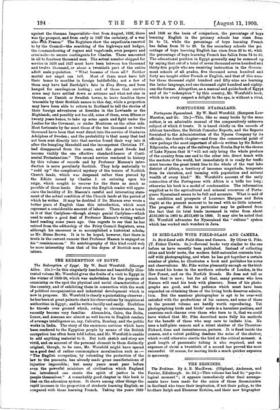THE REGISTER OF THE PRIVY COUNCIL OF SCOTLAND.
The Register of the Privy Council of Scotland. Edited by David Masson. Second Series, VoL I. (1625-27). (Her Majesty's General Register House, Edinburgh.)—Striking testimony to the fact, emphasised by recent writers of Scotland, including Mr. Andrew Lang, that it is only in the future that justice can be done to the mass of materials bearing upon the history of the country that has recently been accumulated, is borne by the editor of this volume of the Privy. Council Registers of Scotland, Emeritus-Professor Masson : "Whether from indolence or from defect of accessible materials, this early portion of the reign of Charles I. has been all but entirely skipped by modern historians, and the information available concerning it is now made public for the first time." That information is of considerable, if not quite of the greatest, importance. The Privy Council of Scotland remained throughout all the storms of its history what Dr. Masson terms it, "the central body of the nation administering affairs by its own sagacity though under constant instructions from the King." The Council was reconstructed when Charles ascended the throne, and the Register of its proceedings—admirably summarised and elucidated by Professor Masson in an introduction of two hundred pages—shows how Scotland gave its King help in his wars. "It is no mistake to use the word ' wars ' in the plural. For the first /oar or five months of the reign, indeed, the one great war was the continued war with Spain in the various ratniflcationa into which it had divided itself—war at sea against Spain direct, war of offence and defence at sea against the Dunkirkers or other cruisers from the Spanish Netherlands, inland war on the Continent in rescue of Count Manafield's wild enterprise fet the recovery of the Palatinate, or in support of the Dutch Republic, or by subsidies to Christian IV. of Denmark as Generalissimo against the German Imperialists—but from August, 1626, there was the prospect, and from early in 1627 the certainty, of a war also flth France." The Registers show the expedienta resorted to by the Council—the searching of the highways and hedges, the commandeering of rogues and vagabonds, even paupers and criminals—to secure contingents for Charles. These amounted in all to fourteen thousand men. The actual number shipped for service in 1626 and 1627 must have been between ten thousand and twelve thousand, or about a twentieth part of the entire adult male population. "What became of them all ? Neither mortal nor angel can tell. Most of them must have left their bones to moulder in foreign battlefields ; not a few of them may have had Bardolph's fate in King Henry, and been hanged for sacrilegious looting ; and of those that survive some may have settled down as artisans and what not else in German or Danish or Swedish towns, to leave families there traceable by their Scottish names to this day, while a proportion may have been able to return to Scotland to tell the stories of their foreign adventures at firesides in the Lowlands or the Highlands, and possibly not too old, some of them, even fifteen or twenty years hence, to take up arms again and fight under the Lealies for the Covenant, or under Montrose on the other side. Most fortunate by far must those of the ten thousand or twelve thousand have been that went direct into the service of Gustavus Adolphus of Sweden ; and the probability is that many that had not been sent directly into that service found their way into it after the bungling Mansfield and the incompetent Christian IV. had disappeared from the scene, and the great Swede had become visibly the one effective standard-bearer of Conti- nental Protestantism." The second service rendered to history by this volume of records and by Professor Masson's intro- duction is more peculiarly Scottish. They help materially to " reld up" the complicated mystery of the tenure of Scottish Church lands, which was deepened rather than pierced by the Edicts issued by Charles I. on entering upon his reign, which sought to recover for the State as much as possible of these lands. But even the English reader will appre- ciate the lucidity of Dr. Masson's careful and interesting state- ment of the actual condition of the Church lands at the period of which he writes. It may be doubted if Dr. Masson ever wrote a better piece of English than this introduction, which must represent a considerable amount of labour. There is not a touch in it of that Carlylese--though always genial Carlylese—which used to make a good deal of Professor Masson's writing rather hard reading some years ago. One regrets to see that he has retired from the editorship of the Privy Council Registers, even although his successor is so accomplished a historical scholar as Mr. flame Brown. It is to be hoped, however, that there is truth in the current rumour that Professor Masson is engaged on his " reminiscences." No autobiography of this kind could well be more interesting than that of the doyen of Scottish men of letters.



































 Previous page
Previous page